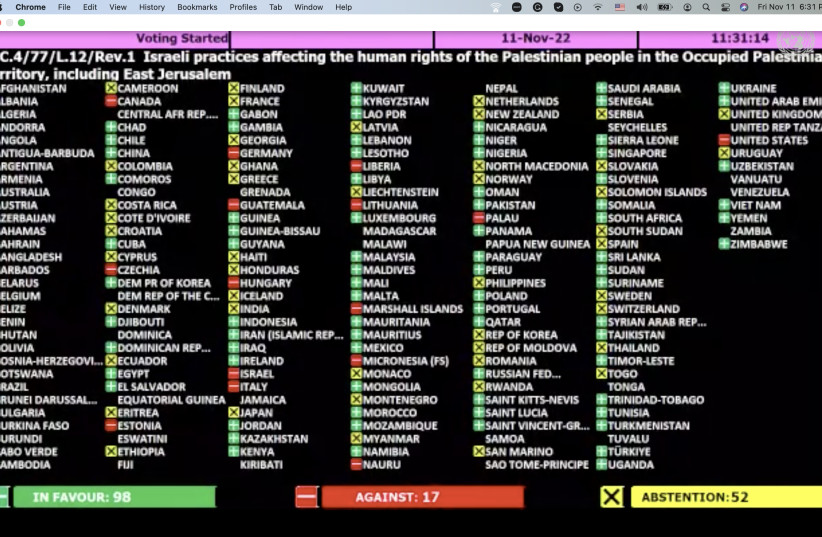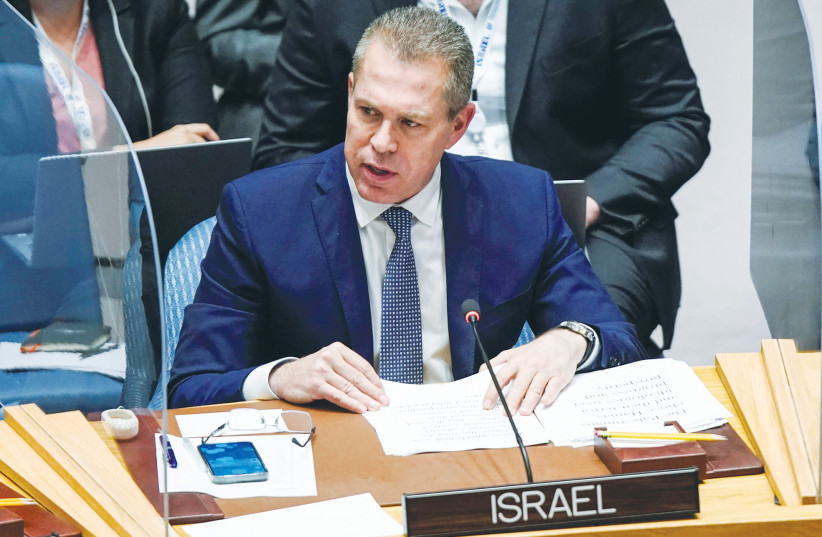by Tovah Lazaroff, Lahav Harkov
Israel, the United States, Canada and Australia were among those nations who opposed the move.
The UN General Assembly voted 98-17 to seek an advisory opinion from the International Court of Justice on the illegality of Israel’s “occupation” of Palestinian territories on the grounds that it can be considered de-facto annexation.
The resolution specifically asked the ICJ for an opinion on the status of Jerusalem, which is one of the most volatile and contentious points of discord between Israelis and Palestinians.
The broad-range resolution also ignored Jewish ties to its holiest site, the Temple Mount in Jerusalem, referring to it solely by its Muslim name of al-Haram al-Sharif (the Noble Sanctuary).
Israel, the US, Canada and Australia were among the nations who opposed the ICJ referral when the UN General Assembly Fourth Committee held its preliminary vote on Friday in New York. In recent weeks, US Secretary of State Antony Blinken asked Palestinian Authority Mahmoud Abbas not to put the resolution to a vote and lobbied like-minded countries to oppose it.
The issue must get final approval from the full UNGA before going to The Hague.

Prime Minister Yair Lapid warned that the vote could ignite more violence from the Palestinians.
“This step will not change the reality on the ground, nor will it help the Palestinian people in any way; it may even result in an escalation,” he said. “Supporting this move is a prize for terrorist organizations and the campaign against Israel.”
Lapid said Israel rejects the Palestinian resolution, a “unilateral... move which undermines the basic principles for resolving the conflict and may harm any possibility for a future process.
“We call upon all the countries that supported yesterday’s proposal to reconsider their position and oppose it when it’s voted upon in the General Assembly. The way to resolve the conflict does not pass through the corridors of the UN or other international bodies,” the prime minister stated.
Ambassador to the UN Gilad Erdan tweeted that “there is no authority that can declare that the Jewish nation is an occupier in its homeland.”
“Unilateral measures” such as an ICJ appeal “will be met with unilateral measures,” Erdan warned.
What does the resolution say?
THE RESOLUTION states that after 56 years, Israel’s hold on territories it captured from Jordan, Egypt and Syria in the defensive 1967 Six Day War, can be considered tantamount to de-facto annexation and thus illegal under international law.
Since the Six Day War, Israel has applied sovereignty to east Jerusalem and the Golan Heights but left the West Bank under IDF military and civilian rule.
The international community does not recognize Israeli sovereignty in Jerusalem, and only the US accepts Israel’s annexation of the Golan.
Israel withdrew from Gaza, but the international community still holds that the coastal enclave is under Israeli “occupation” due to the IDF’s control of much of its borders.
"By co-opting the ICJ to impose a political decision the Palestinians are given the perfect excuse to continue boycotting the negotiating table to perpetuate the conflict."
Israeli Ambassador to the UN Gilad Erdan
The Palestinians hold that all of east Jerusalem, the West Bank and the Gaza territory should be part of the borders of the future state. Israel, in contrast, has insisted that a two-state resolution to the conflict cannot be based on that pre-1967 boundary.
Past peace processes have not bridged that difference.
An ICJ opinion on the matter is non-binding, but would help codify into international law the Palestinian insistence that all that pre-1967 territory should be within the final boundaries of its future state.
At Friday’s meeting, the United States and Israel charged that the resolution was an attempt to bypass a negotiated resolution to the conflict with the Palestinians and, as such, ran counter to past UN resolutions including at the Security Council, which called for such talks.
“The Palestinians have rejected every single peace initiative, and now they embroil an external body with the excuse that the conflict has not been resolved – but the only reason why it has not been resolved is because of their rejectionism,” Erdan said.
“They claim that they are ready to negotiate, but what they fail to mention is that they are only ready to do so if they are guaranteed 100% of their demands before they even sit down at the negotiating table,” the ambassador explained.
He noted that it was convenient for the Palestinians to historically reject peace plans and then claim that the conflict was permanent and illegal because Israel had not met its demand for a full withdrawal to the pre-1967 lines.
“Exploiting a UN organ by enlisting the UN’s politicized anti-Israel majority for the purpose of forcing your demands instead of negotiating, is clearly a unilateral step,” he said.
Erdan also took issue with the resolution’s failure to speak of the Jewish connection to the Temple Mount.

“This is not an ignorant mistake, but another attempt to distort history and erase the bond between the Jewish people and Jerusalem,” he said.
US Representative Andrew Weinstein said the “failure” in such resolutions “to acknowledge the shared history of the [al-] Haram al-Sharif/Temple Mount, a site sacred to both Jews and Muslims, is perhaps the clearest demonstration that they are intended only to denigrate Israel, not to help achieve peace.”
Palestinian ambassador thanks those who voted for
AFTER THE vote, PA Ambassador Riyad Mansour thanked all the nations that endorsed and supported the resolutions.
“Nothing justifies standing with Israeli annexation and occupation,” Mansour said, noting that these actions went against the UN Charter.
“This occupation needs to end,” he said.
The resolution asks the ICJ to advise on “the legal consequences arising from the ongoing violations by Israel of the right of the Palestinian people to self-determination from its prolonged occupation, settlement and annexation of the Palestinian territory occupied since 1967.”
This includes, the resolution stated, “measures aimed at altering the demographic composition, character and status of the Holy City of Jerusalem and from its adoption of related discriminatory legislation and measures.”
In addition, the resolution asked the ICJ to explain how Israel’s policies and practices “affect the legal status of the occupation” and what are the “legal consequences that arise for all states and the UN from this status.”
Among the nations that opposed the text were Austria, Bulgaria, the Czech Republic, Estonia, Germany, Guatemala, Hungary, Italy, Liberia, Lithuania, the Marshall Islands, Micronesia, Nauru and Palau.
Many European countries abstained including Bulgaria, Croatia, Cyprus, Denmark, Finland, France, Greece, Latvia, Lichtenstein, the Netherlands, Norway, Romania, Slovakia, Spain, Sweden, Switzerland and the United Kingdom.
Ireland, Poland and Ukraine, which continued to ask Israel for military aid as recently as last week, were among the countries that supported the ICJ referral.
This is the second such ICJ referral. In 2004, the court issued an advisory opinion against Israel’s security barrier, explaining that its construction in east Jerusalem and the West Bank was illegal.
Tovah Lazaroff, Lahav Harkov
Source: https://www.jpost.com/breaking-news/article-722141
No comments:
Post a Comment